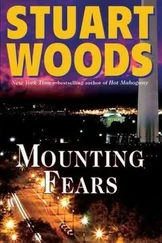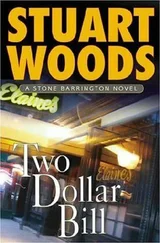He read the Times for an hour and was about to start on the cross-word when Felicity emerged from Dick’s office.
“Everything all right?” Stone asked.
“Pretty much,” she replied. “Is that the package from Hackett?”
“I assume so; it’s from a London address in Mount Street, and it’s addressed to you, so I didn’t open it.”
“That’s very discreet of you,” she said, patting his cheek. “Open it.” Stone pulled the tab, opened the box and shook out a heavy, dun-colored envelope of the sort that British businesses used.
“Open the envelope,” Felicity said, resting her cheek against his shoulder, as if she didn’t want to touch the package.
“You were expecting a bomb, maybe?”
“If I were expecting a bomb, I would be in another room,” she said. “Open it.”
Stone ran a finger under the flap and opened the envelope. A thick, brown file folder fell into her lap.
“Don’t touch it,” she said. “We need latex gloves. I saw some in a drawer in Dick’s office. I’ll get them.” She got up, ran to the office and returned with two pairs. She handed Stone one, and they each pulled theirs on. “Now,” she said, “open the folder.”
Stone opened the folder and was presented with what appeared to be the Royal Army Reserve service record of one James Hewitt Hackett, aged twenty upon enlistment. A photograph of a young man with a very short haircut was stapled to the upper right-hand corner. The photograph, yellowed with age, appeared to be the twenty-year-old Jim Hackett, whose nose had not yet been broken. “Looks like Jim,” Stone said.
“The folder and the paperwork look well aged,” Felicity said. “I’ll have that checked into. Keep turning pages.”
Stone went very slowly through the dossier, finding reports on the initial training of the young Hackett; his marksmanship scores, all of which were at the expert level; his physical training results, which pronounced him fit and fleet; his medical records, including the setting of the broken nose suffered during training, which pronounced him hale; and his annual evaluations by his superiors, which pronounced him of good character and high intelligence. He had been steadily promoted to his final rank of company sergeant, and the dossier included a recommendation that he be sent to Sandhurst and, upon graduation, be commissioned into the Royal Army. The file ended with a copy of a letter from the regimental commander regretting Hackett’s decision to leave the army at the end of his enlistment, imploring him to reconsider and, finally, wishing him well in civilian life.
“That’s quite a record,” Stone said.
“You notice,” Felicity replied, “that this dossier and everything in it appear untouched by water, whereas all the other regimental records lie, sodden, in a warehouse in Kent?”
“That seems to be the case,” Stone admitted.
“So, if the dossier is genuine, it was removed from the regimental records before they were shipped to Kent.”
“Apparently. How long ago were they shipped?”
“That information is as damp as the files themselves,” she replied, “but we estimate the transfer as having taken place about twenty years ago, leaving Sergeant Hackett about a five-year window for the appropriation of his dossier, which is, of course, the property of the Royal Army. He could be done for that.”
“Surely there’s a statute of limitations for such a crime,” Stone said, “which doesn’t seem of any great magnitude.”
“Perhaps there is such a statute, but I assure you, the Royal Army would not look kindly upon such a theft.”
Stone picked up the FedEx box to be sure it was empty and then extracted another, folded FedEx box and a sealed envelope addressed to Dame Felicity. Stone handed her the envelope, but she motioned for him to open it. Stone did so and extracted a letter, which he read aloud:
My Dear Dame Felicity,
I hope the enclosed dossier will be of help to you and your people in your endeavors to ascertain my identity. Perhaps you are wondering if it is genuine? It is. Perhaps you are wondering how I came to possess it? Some years after leaving the regiment I visited its headquarters on Salisbury Plain for luncheon, at the invitation of my former colonel. After a good lunch, during which much wine and port were consumed, the colonel took me into the regimental offices, where many boxes of old records were being packed to be sent for storage. He instructed a corporal who was working there to unearth my dossier, which the young man did with dispatch. We then returned to the colonel’s office, where he read the dossier to me and then presented it to me as a gift, saying that, since I was now an alumnus of the regiment, they would have no further use of it.
Having read it yourself, and no doubt having copied it into your service files, I would be grateful if you would return the dossier to my New York office in the box and with the FedEx waybill provided, since I hold a sentimental attachment for the history.
Cordially,
The letter was signed “Jim.”
“Well, he’s right about one thing,” Felicity said, standing and picking up the dossier. “It’s going to be copied into our files.” She went back into the office and closed the door behind her.
They packed a lunch, then walked down Dick Stone’s dock to where two boats awaited them: a Concordia and a Hinckley picnic boat. “Do you sail?” Stone asked.
“A little as a child, but that’s all,” she replied.
“Then we’ll take the picnic boat,” he said, stepping aboard and helping her to follow. He put their lunch in the galley, got the engine started, and Felicity cast them off. They motored slowly past the little Tarrantine Yacht Club and its dock and moorings, then Stone pressed the throttle forward and, with the warm sun on their backs, they ran across the open water of Penobscot Bay to a little cove called Pulpit Harbor, where Stone slowed the thirty-six-foot runabout and, finally, dropped anchor in the sheltered waters. Two other small sailing yachts also were anchored there, but there was room for everyone with privacy to spare.
Felicity went below for a few minutes, then brought up a tray with their sandwiches and soup while Stone opened a bottle of California chardonnay from the little fridge.
“Well,” Stone said, when they were munching away, “did the receipt of Hackett’s army service record do anything to convince you he is who he says he is?”
“Certainly not,” she replied, forking a piece of lobster into her mouth.
“Why don’t you get in touch with his old colonel and check out the story about how he got the file?”
“It’s being done as we speak,” she replied.
“So, if a retired colonel, living in a cottage somewhere in Sussex or Cornwall, declines to admit that he had too much wine at lunch one day and gave one of his old soldiers his own dossier that was about to be stored forever, Hackett is Whitestone?”
“Not necessarily. But if the story doesn’t check out, he may not be Hackett, and that’s a start.”
“God, I’m glad you’re not checking into my background,” he said, laughing.
“What makes you think I haven’t?” she asked coyly.
“You didn’t; you wouldn’t.”
“Let’s see: son of a West Massachusetts family who did well in the textile business in the nineteenth and early twentieth centuries; father disowned because he had Communist tendencies and chose to follow a career in carpentry and cabinetmaking instead of an education at Yale; mother disowned because she married your father. They moved to Greenwich Village, where your father found work as a handyman, then gradually built a business making cabinets and designing furniture; your mother became a painter of some renown, whose work is sought today in the art market. How’m I doing?”
Читать дальше












